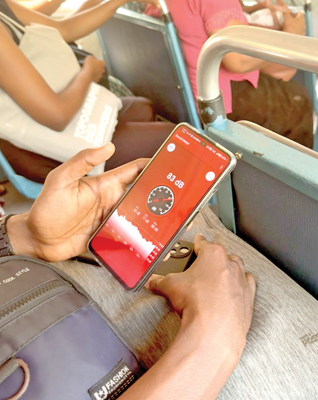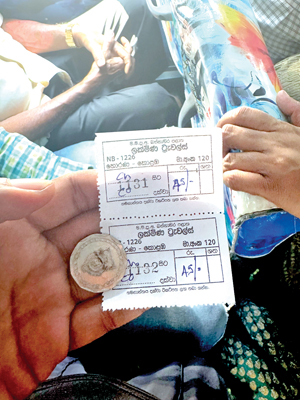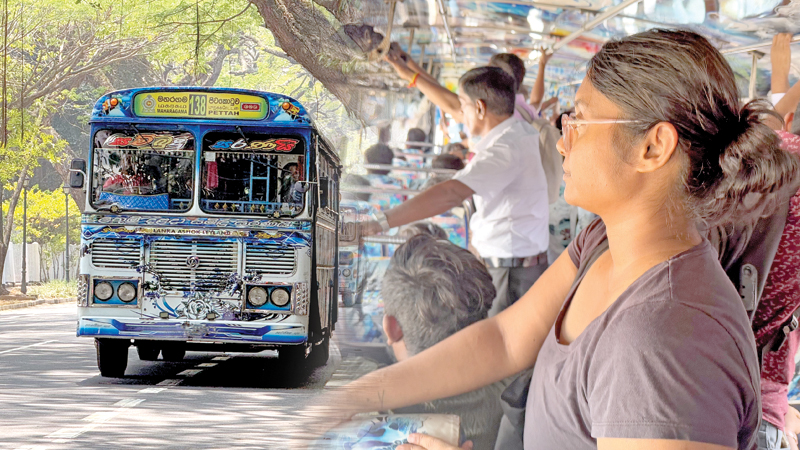 To truly understand the frustrations of public transport users in Sri Lanka, the four of us started on a journey through Colombo by bus. We didn’t just want to observe, we wanted to experience firsthand what thousands of passengers go through every day. Along the way, we spoke to everyday commuters, students, labourers and the elderly whose voices are often ignored in the conversation regarding public transport reform.
To truly understand the frustrations of public transport users in Sri Lanka, the four of us started on a journey through Colombo by bus. We didn’t just want to observe, we wanted to experience firsthand what thousands of passengers go through every day. Along the way, we spoke to everyday commuters, students, labourers and the elderly whose voices are often ignored in the conversation regarding public transport reform.
Chaos of a bus ride
The journey began at the Colombo Public Library, where the reporter boarded a bus on route number 138, which plies from from Maharagama to Colombo Fort. The moment one steps into the bus, the blaring music hits you like a bolt from the blue. The sound is deafening, far beyond the permissible 80-decibel limit. It was clear that passenger comfort was the least of the driver’s concerns.
 When the reporter later spoke to a 73-year-old woman who had been travelling by bus for over 50 years, her words painted a sad picture. “These days’ buses are not as safe as they used to be. Drivers are reckless and conductors treat us like as if we are a burden. If we ask for a ticket, they make it out as if we are causing trouble. But what choice do we have? We have to endure this every day.”
When the reporter later spoke to a 73-year-old woman who had been travelling by bus for over 50 years, her words painted a sad picture. “These days’ buses are not as safe as they used to be. Drivers are reckless and conductors treat us like as if we are a burden. If we ask for a ticket, they make it out as if we are causing trouble. But what choice do we have? We have to endure this every day.”
At the same bus stop was a 19-year-old A/L student who frequently travels on bus route number 120. “I always pay the exact fare of Rs. 27 but the conductor never issues a ticket. This system needs to change. We need electronic tickets just as in other countries, where payment is transparent and accountability is ensured”
The alarming number of road accidents further compound Sri Lanka’s public transport crisis, many involving reckless bus drivers. According to the Sri Lanka Police, road accidents claimed over 3,000 lives in 2023, with buses reportedly contributing to nearly 20% of fatal collisions. A recent tragedy on 10 February 2025 where four passengers were killed and 25 were injured in a bus collision in the Thorayaya area of Kurunegala. The World Bank states that Sri Lanka’s road fatality rate of 22.6 per 100,000 people far exceeds the global average, with poorly regulated private buses playing a disproportionate role. These incidents underscore a systemic failure to hold operators accountable, leaving commuters to pay the price not just suffering the discomfort but paying with their lives.
A silent struggle
We then visited the University of Colombo, where thousands of undergraduates rely on public transport on a daily basis. Among them, most were young women and 90% of them faced harassment at least on one occasion while commuting.
Minaya, a second-year management student shared her troubling experiences. “I have been harassed twice. The first time, I shouted at the man and he quickly got off the bus. But that doesn’t change the reality that we have to constantly be on guard” adding “Buses take a long time to reach their destination. It takes 90 minutes to travel from Kottawa to Colombo.
The other problem is the noise inside buses and the blaring music one has to put up with. During examination periods, it takes a long time to get to the university, so most of the time when I attempt to do some last minute studying while in the bus, I am unable to do anything due to the noise in the bus. Although buses are somewhat safe during the day, travelling at night is challenging and unsafe”.
Thilanga, a political science student spoke about another aspect. “Buses are seen purely as a way to make money. Passengers are not treated as human beings but as revenue sources. The lack of respect for commuters is evident from reckless driving to the poor design of buses.”
A system that rewards exploitation

The blaring sound-going over the 80-decibel limit
As we continued our journey towards Colombo Fort, we boarded bus with route number 120 from Horana to Colombo Fort (NB-1226). When we gave the conductor a Rs 100 note for two tickets, he simply walked away without issuing tickets or returning the balance. We had to ask him twice before he finally gave us two tickets and the balance Rs 10. But not everyone was as lucky to get a ticket or get their balance. Some passengers were simply ignored after they gave their fare”.
This was not an isolated incident. Buses are required to display details of the conductor, driver and route number, yet in this bus none of this information was displayed. Instead, advertisements for speaker installation services and sticker designs covered the walls. The driver, meanwhile, was talking on his mobile phone while steering through Colombo’s congested streets and he was without a seatbelt. At Colombo Fort, Ravindu Fernando, one of our fellow travellers put it bluntly. “The minimum right of a passenger is to get a ticket. Yet, even this is a struggle. The authorities must enforce the existing laws because laws do exist. They’re just not implemented”, he said.
At the Colombo Fort bus stand, the Sunday Observer met Parami Weerasena, a Kelaniya university undergraduate from Embilipitiya who frequently commutes to Colombo. Her experience was deeply disturbing:
“When I come to Colombo from my hometown Embilipitiya, I often face many problems where men harass me. Men around my father’s age harass me more than the younger ones. Sometimes when we protest, they talk to us insultingly, saying “You should go in private vehicles.” Parami added “When we travel at night, people look at us in an insulting way.
Women working in garment factories face a lot of issues in Sri Lanka and society looks at them in a negative way. This is wrong. We also face similar problems that they face when we travel at night. They try to mistreat us by coming to unwarranted conclusions. In such instances, we feel helpless.
No passenger will speak on our behalf. Having said that, there have been instances where some young men have spoken up for us. But in many instances, even women seem to ignore us. I request them not to do that.”
Her words remind us of the findings of a 2015 UNFPA study, which revealed in Sri Lanka, women face significant challenges when using public transport, particularly concerning safety and the prevalence of sexual harassment. A 2015 study by the United Nations Population Fund (UNFPA) revealed that 90% of women have experienced sexual harassment on public buses and trains, yet only 4% reported these incidents to the police.

The non issue of tickets- a major problem
This issue not only affects women’s well-being but also has broader societal implications. The same UNFPA study found that 37% of women reported that harassment adversely impacted their workplace performance, while 29% indicated negative effects on their education. Cultural norms and societal attitudes often discourage victims from speaking out.
Research by Oxfam in 2019 showed that bystanders frequently view harassment as a private matter, leading to a lack of intervention. This societal apathy contributes to the normalisation of such behaviour making public transport a daunting experience for many women.
Societal silence
Societal silence regarding the issue has normalised harassment making public transport an unsafe space for women. Jayani Abeysekara and Hiranya Devasiri who have been travelling with us, shared their thoughts. “Such violence faced by women in public transport has now been generalised by society. This is a very dangerous trend. This is not a new issue but one that is seen against women in all sectors in Sri Lanka.
Much of it begins at home and moves to harassment in public transport. Similarly, men too face sexual harassment on public transport. We met men who have faced such problems” Jayani added, “As a woman I have faced harassment while travelling in public transport and it has become common that society just treats such things as normal. This is a dangerous trend. If we continue to treat these violations as everyday inconveniences, nothing will change. A safe public transport system is not a privilege it’s a right for men and women.”
The path forward
At the end of the journey, it was evident that the problems in the public transport system were not isolated incidents.
They are systemic. From reckless driving and the absence of ticketing systems to rampant harassment and unregulated private operators, the issues are deeply entrenched. People have forgotten that free and comfortable bus travel is a right for all who pay to travel by bus. However, this doesn’t mean change is impossible.
Citizens must demand for a better service. Passengers should insist on getting tickets, reckless driving must be reported and the public must stand up against harassment. Most importantly, the authorities must stop turning a blind eye and enforce the laws that already exist. Public transport should serve the people, not exploit them. If the public unites, change is not just possible it is inevitable!









